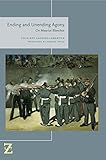Ending and Unending Agony : On Maurice Blanchot / Philippe Lacoue-Labarthe.
Material type: TextSeries: Lit ZPublisher: New York, NY : Fordham University Press, [2015]Copyright date: ©2015Description: 1 online resource (168 p.)Content type:
TextSeries: Lit ZPublisher: New York, NY : Fordham University Press, [2015]Copyright date: ©2015Description: 1 online resource (168 p.)Content type: - 9780823264582
- 9780823264605
- 843/.912 23
- PQ2603.L3343
- online - DeGruyter
- Issued also in print.
| Item type | Current library | Call number | URL | Status | Notes | Barcode | |
|---|---|---|---|---|---|---|---|
 eBook
eBook
|
Biblioteca "Angelicum" Pont. Univ. S.Tommaso d'Aquino Nuvola online | online - DeGruyter (Browse shelf(Opens below)) | Online access | Not for loan (Accesso limitato) | Accesso per gli utenti autorizzati / Access for authorized users | (dgr)9780823264605 |
Frontmatter -- Contents -- Translator's Note -- Introduction -- Prologue -- I. "The Secret Miracle" (20 July?) -- II. Ending and Unending Agony (22 September?) -- Notes -- Bibliographical Note -- Index of Names -- Sara Guyer and Brian McGrath, series editors
restricted access online access with authorization star
http://purl.org/coar/access_right/c_16ec
Published posthumously, Ending and Unending Agony is Philippe Lacoue-Labarthe's only book entirely devoted to the French writer and essayist Maurice Blanchot (1907-2003). The place of Blanchot in Lacoue-Labarthe's thought was both discreet and profound, involving difficult, agonizing questions about the status of literature, with vast political and ethical stakes.Together with Plato, Holderlin, Nietzsche, Benjamin, and Heidegger, Blanchot represents a decisive crossroads for Lacoue-Labarthe's central concerns. In this book, they converge on the question of literature, and in particular of literature as the question of myth-in this instance, the myth of the writer born of the autobiographical experience of death.However, the issues at stake in this encounter are not merely autobiographical; they entail a relentless struggle with processes of figuration and mythicization inherited from the age-old concept of mimesis that permeates Western literature and culture. As this volume demonstrates, the originality of Blanchot's thought lies in its problematic but obstinate deconstruction of precisely such processes.In addition to offering unique, challenging readings of Blanchot's writings, setting them among those of Montaigne, Rousseau, Freud, Winnicott, Artaud, Bataille, Lacan, Malraux, Leclaire, Derrida, and others, this book offers fresh insights into two crucial twentieth-century thinkers and a new perspective on contemporary debates in European thought, criticism, and aesthetics.
Issued also in print.
Mode of access: Internet via World Wide Web.
In English.
Description based on online resource; title from PDF title page (publisher's Web site, viewed 02. Mrz 2022)


